

Why remote working doesn't have to mean alienated employees. • Increased remote working means a greater need for clear communication. • Misunderstandings arise from a lack of face-to-face contact. • Implementing a 'culture of feedback' helps establish the protocol for better conversations.
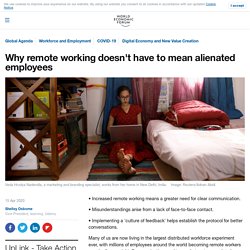
Many of us are now living in the largest distributed workforce experiment ever, with millions of employees around the world becoming remote workers practically overnight. For organizations and teams fortunate enough to be able to work from home, the last few weeks have been ones of adjustment and learning. As a leader at a company that prioritizes feedback, I’ve been focusing on the most effective ways for our remote workers to have difficult conversations, as well as helping leaders at other organizations think about approaching performance feedback and potential lay-offs.
5 Things to Avoid when Giving Constructive Criticism. The Next Frontier of Learning Engineering: AI That Teaches Other AI. Humans tutoring other humans works pretty well.

The trouble is, it requires a lot of people. Artificially intelligent tools tutoring humans works pretty well, too—but building those digital systems takes time and expertise. What Good Feedback Really Looks Like. How to Give Tough Feedback That Helps People Grow. Future focus has the power to transform the practice of feedback. Feedback discussions often backfire.
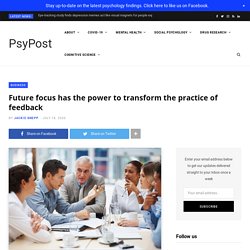
New research points to a more effective way to motivate another person to change: future-focused feedback. Psychologists have known for decades that feedback is often ineffective in helping people improve and it can be destructive to relationships. Yet giving feedback is considered a key element of mentorship, coaching, supervision, parenting, education, and conflict resolution in intimate relationships. In all these instances, the purpose of feedback is to motivate and direct positive behavior change. We provide the first evidence that feedback discussions may be counterproductive, increasing disagreement, not about what happened, but about where the fault or responsibility lies. Study 1 involved an international survey of managers who described hundreds of real work experiences. The potential value of this work is large and broad ranging. To be most effective, feedback should focus on the future rather than on analysis of past events.
Why Feedback Rarely Does What It’s Meant To. Stop Asking for Feedback. Feedback has little impact on our performance and over one-third of the time, it actually negatively impacts it.
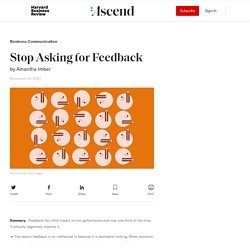
The reason feedback is so ineffectual is because it is backward-looking. When someone gives you feedback, they’re anchoring... Many years ago, I applied for a role I had considered my dream job. Why Top Performers Ask for Advice, Not Feedback. Inc. How to Give Tough Feedback That Helps People Grow. Google’s Former Career Coach Recommends This Trick to Boost Employee Engagement. Starting in 2008, Google has conducted extensive research into what makes a great manager. They called it “Project Oxygen” and, over time, identified the 10 behaviors that Google’s best managers share. Number one on the list? Being a good coach. Knowing how important this is, Google has baked coaching in at every step of its employees' career paths, from new Googlers receiving help navigating the culture to executive development training for leaders.
This program has been widely successful, with coaching sessions receiving an average employee satisfaction rating of 4.8 out of 5. With employees switching jobs more than ever, keeping your best talent engaged and motivated is essential. Google’s Career Guru program allows existing employees to support their peers. Can 'light-touch, targeted feedback' to students improve their perceptions of and performance in a class?
Students benefit from increased faculty engagement.
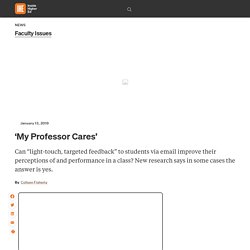
Yet many professors still resist more student-centered teaching. Part of the problem is that graduate schools are slow to adopt pedagogical training, meaning that some professors may want to up their interaction with students but don’t know how. Another part of the problem is that becoming a better teacher takes time, an increasingly scarce faculty resource.
What if engagement wasn’t complicated and didn’t take that much time? Preliminary research called "My Professor Cares: Experimental Evidence on the Role of Faculty Engagement," presented last week at the annual meeting of the American Economics Association, suggests that even “light touch” interventions can make a difference to students. “Everything we know from K-12 education is that teaching matters,” said co-author Michal Kurlaender, professor and chancellor’s fellow in education at the University of California, Davis. Another Setting Source: Kurlaender and Carrell. How to Accept a Compliment — Even if It’s From Yourself. How To Give Feedback People Actually Respond To. A tech executive I coached recently was having a hard time getting things done.
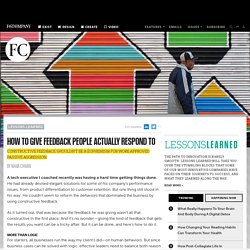
He had already devised elegant solutions for some of his company's performance issues, from product differentiation to customer retention. But one thing still stood in his way: He couldn't seem to reform the behaviors that dominated the business by using constructive feedback. As it turned out, that was because the feedback he was giving wasn't all that constructive in the first place. A Simple Exercise to Strengthen Emotional Intelligence in Teams. By Gayle Allen “She needs every detail before we start, and it slows us down.”

“He acts before we agree on a plan, so we make a lot of mistakes.” Sound familiar? Giving S.M.A.R.T. Feedback to Millennials.